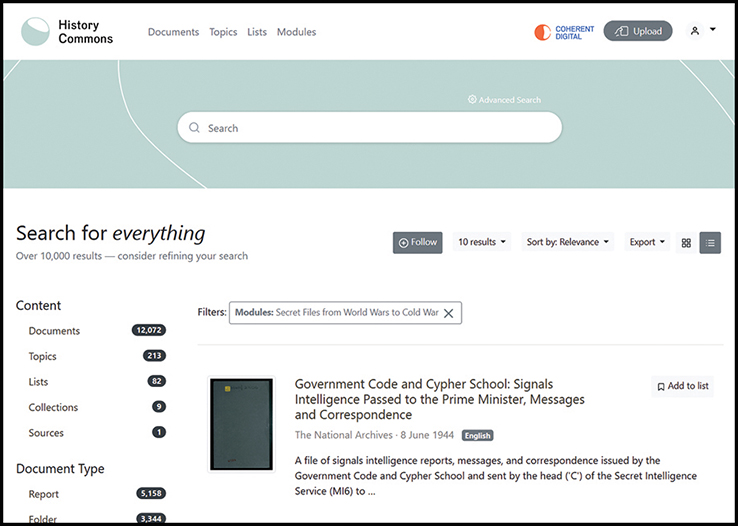Secret Files from World Wars to Cold War | eReview
Secret Files from World Wars to Cold War is an excellent compilation of primary documents. The collection of 12,000 documents explores British government secret intelligence files on four key 20th-century conflicts: the Spanish Civil War, World War II, the early years of the Cold War, and the Korean War.
coherentdigital.net/sefi
CONTENT Secret Files from World Wars to Cold War is an excellent compilation of primary documents from Coherent Digital, hosted on its History Commons platform. The collection of 12,000 documents explores British government secret intelligence files on four key 20th-century conflicts: the Spanish Civil War, World War II, the early years of the Cold War, and the Korean War. Emphasis is on World War II materials, with most of the archive’s files dating from the 1930s and the 1940s. Content consists of correspondence directives, financial reports, maps, meeting minutes, memoranda, reports, and signals intelligence miscellany. Documents are sourced from nine series of files in the Permanent Undersecretary’s Department (PUSD), including materials from the Joint Intelligence Subcommittee, War Cabinet, and Ministry of Defence. The database is directed at students, researchers, instructors, and subject specialists in academic libraries.
USABILITY The History Commons platform is spartan in appearance but robust in functionality. What the home page lacks in bells and whistles is more than made up for in high usability, ease of navigation, and sensible search options. At the top of the home page are a search box with an advanced-search option and four broad gateways for retrieving materials: Documents, Topics, Lists, and History Commons Modules. Documents lists all publications in the collection with relevance and date sorting options; Topics provides an alphabetical listing and links to 213 subjects; Lists allows users to access self-created lists as well as ones created by other users; and History Modules enables cross-searching across the four collections of the History Commons platform.
The search box is best for keyword and subject inquiries. Advanced search allows users to narrow their searches by keyword/phrase, date, organization, organization type, language, module, and topic. Materials are also discoverable from the home page by content, document type, source, language, year, and topic.
Completed searches are highly satisfactory, returning quick, accurate, and detailed results. For instance, when entering the word “nurses” in the search box, results include 50 documents, including a fascinating January 1944 report on medical conditions in the Chinese army. Under “document type,” users can then select “correspondence” and read “Pensions for Relatives of Individuals Killed While in Employ of the Secret Service,” a file of letters discussing payments of secret funds to relatives of people killed in the Secret Service. All the other documents returned with this search are equally compelling.
Multiple options are available for filtering. Documents can be shared via email, Twitter, Facebook, and LinkedIn.
PRICING The database is available as a one-time purchase of perpetual rights. The list price is $60,000, but pricing is scaled to library size and type, ranging from $54,000 for the largest ARL to $27,600 for the smallest institution. Consortium prices will be lower. After one free year, the annual service fee ranges from $350 to $500, and one service fee will cover up to six modules on the History Commons platform.
VERDICT The documents in Secret Files from World Wars to Cold War are a significant addition to the field of British and 20th-century intelligence studies. They provide firsthand insights into planning operations, wartime strategies, and covert/overt actions that were essential to British and Allied efforts for over 50 years. This is an especially excellent resource for scholars and students of World War II and the Cold War.
RELATED
ALREADY A SUBSCRIBER? LOG IN
We are currently offering this content for free. Sign up now to activate your personal profile, where you can save articles for future viewing










Add Comment :-
Comment Policy:
Comment should not be empty !!!